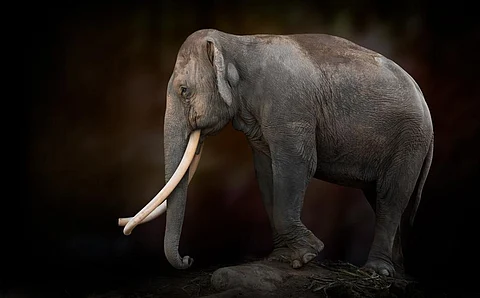

The Karnataka Forest Department successfully trimmed the tusks of a live elephant recently, marking a significant achievement. This unique procedure, likened to a ‘tooth extraction’, aimed to resolve two critical issues: Easing the elephant’s feeding difficulties and protecting local villagers in the Chamarajanagar district.
The wild tusker, which had encroached upon villages around the Bandipur Tiger Reserve in Gundlupet taluk, faced significant challenges due to its dentition. The tusks had intertwined, preventing the pachyderm from lifting its trunk to reach higher tree branches. As a result, the tusker resorted to raiding farmers’ lands and damaging crops in the Gopalaswamy hills of the tiger reserve.
The Bandipur Forest Department decided to trim the tusks to address the problem. After securing necessary permissions, they captured the elephant in the Gundlupet taluk. The officials then successfully cut the tusks, allowing the elephant to regain its health.
“We usually keep an eye on the tusks of the kumkis (tame elephants) in our camps and take measures to keep them at healthy levels so that the animal is able to graze normally. But this was a wild elephant, and invariably, we had to sedate him and saw off the troublesome parts of the tusks,” Bandipur CFO Prabhakaran told Down To Earth (DTE).
“We had ascertained from the elephant vets in the forest department and outside, that the trimming of tusks would not harm the animal in any way. We were told that the tusks are something like cutting our nails, which do not have any touch perception, and hence it was a total painless operation,” he added.
The elephant was released into the Gundre zone forest near the Kabini backwaters on May 8. The forest officials closely monitored its movements. They observed that the elephant had resumed normal behaviour and returned to deeper forest areas.
“The elephant used to feed on sugarcane, banana plants, tomatoes, and other ground-level vegetables, easily satisfying its hunger by attacking fields. This was a major problem for both farmers and the forest department. After trimming the elephant’s tusks, it is now healthy in the forest. We will continue to monitor the elephant for a few more days,” said Prabhakaran.
Farmers in affected villages — including Hangala, Kaligaudanahalli, Devarahalli, and surrounding areas — had been facing trouble due to the tusker. They are now relieved.
“All the time, we knew about its predicament, and we did humour him a lot. But when the visits became frequent, we had no other way but to approach the forest department for resolution of this problem,” Chennappa Naika, a village elder in Hanagalu, told DTE.
The move by the forest department also earned praise from the state government.
“The department’s dedication to protecting wildlife and promoting community welfare is demonstrated by this effective intervention,” Karnataka Forest Minister Eshwar Khandre told DTE.
“It is one of the rare incidents in Karnataka, if not in India, where an elephant has been rehabilitated effectively after being relieved of its handicap. I am now considering rewarding the forest officials who undertook this operation,” Khandre added.